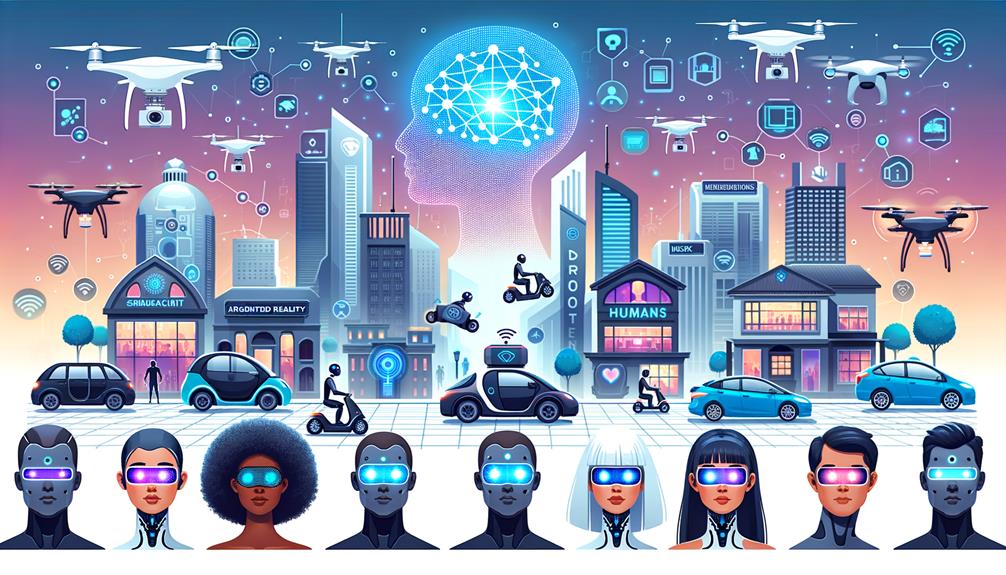

You're already living with AI, whether you realize it or not. Digital assistants manage your schedule and tasks, while personalized recommendations enhance your shopping and entertainment experiences. Smart home devices control your living space, and navigation apps help you avoid traffic jams. AI is also transforming industries like education, healthcare, and business, making them more efficient and effective. As AI continues to evolve, it's shaping future societal norms and practices. You've seen just a glimpse of AI's impact on your daily life – and there's more to discover about how artificial intelligence[1] is changing the world.
Your daily life is likely being influenced by AI in more ways than you realize, from the digital assistants that help you manage your schedule to the personalized recommendations that shape your entertainment and shopping experiences.
AI algorithms are constantly learning and adapting to your habits, making your daily interactions with technology more tailored and efficient.
Smart home devices, for instance, allow you to control lighting, heating, and security systems with ease, making your life more convenient.
As you go about your day, AI-powered navigation apps help you navigate traffic, while digital assistants like Siri and Alexa respond to your voice commands.
The seamless integration of AI into your daily life is changing the way you interact with technology.
Building on the ways AI is already influencing daily life, it's also producing numerous benefits that are transforming how businesses operate, people work, and individuals live.
With AI, you're seeing significant improvements in efficiency across various sectors, which could boost global GDP by $15.7 trillion by 2030. You're also benefiting from enhanced accuracy in decision-making processes, which reduces operational costs for businesses.
AI-powered personalized recommendations are improving your customer experience[2], making it easier to find what you're looking for. Additionally, AI is creating new job opportunities in technology and related fields.
As AI continues to integrate into business processes, you can expect to see even more innovative solutions that drive growth, improve convenience, and increase productivity.
AI is transforming the digital media landscape by leveraging user behavior and preferences to create tailor-made experiences that boost engagement and satisfaction.
You're likely familiar with personalized content recommendations on platforms like Netflix and Spotify, which use AI-driven algorithms to analyze your behavior and suggest content that resonates with you.
Natural language processing technologies, such as chatbots and virtual assistants, are also being used to facilitate seamless interactions between users and digital media.
Additionally, AI tools are being employed in digital media production to create realistic characters and environments through advanced CGI techniques.
Machine learning models are also being used to detect and filter out harmful content on social media, enhancing user experience and safety.
These innovations are revolutionizing the way you consume and interact with digital media.
Numerous educational institutions worldwide are now harnessing the power of artificial intelligence to create more personalized, efficient, and effective learning experiences for students.
You'll find AI-driven platforms transforming degree and diploma programs by integrating adaptive learning technologies, making education more accessible and efficient.
Through AI, you'll get real-time feedback, allowing educators to make timely adjustments in teaching methods and curriculum to better support you.
AI also personalizes learning experiences by analyzing individual student data, creating tailored learning plans to meet diverse needs. This is expected to greatly enhance student engagement and outcomes.
As the demand[5] for skilled professionals in AI and data science grows, institutions are incorporating AI-related courses into their curricula to prepare you for future job markets.
The job market is on the cusp of a significant transformation, with technology replacing certain roles while simultaneously creating new opportunities that require a different set of skills.
You'll notice AI-driven automation affecting nearly a third of tasks currently performed by employees, with manual jobs facing higher risks compared to skilled positions.
As AI technologies advance, the demand for machine learning specialists, data analysts, and AI-related roles will surge.
To adapt, you'll need to upskill and reskill to thrive in this evolving job market.
Over the next two decades, 7 million jobs may be replaced, but 7.2 million new roles will emerge, transforming the workforce.
As you navigate the AI-driven shift in the job market, you'll also need to contemplate the broader implications of these technologies on society, where concerns about algorithmic bias[4], data privacy, and accountability are sparking important debates about ethics. You must consider how AI systems can perpetuate existing societal prejudices if not designed carefully, and how transparency in decision-making processes is necessary for public trust.
| Ethical Considerations in AI | Implications | Actions Needed |
|---|---|---|
| Algorithmic Bias | Perpetuates societal prejudices | Careful design and monitoring |
| Data Privacy | Misuse by corporations and governments | Robust data protection regulations |
| Accountability | Lack of transparency and trust | Clear decision-making processes |
| Ethical Guidelines | Aligns AI with human values and societal goals | Creation and implementation of guidelines |
| Societal Goals | Guarantee AI serves the public interest | Encourage responsible AI development |
You are trained on data up to October 2023.
By harnessing AI's power, you can transform your business operations, automating routine tasks and revealing significant efficiency gains that boost your bottom line.
You'll reduce operational costs, with some companies slashing them by up to 30%.
AI-driven analytics gives you real-time insights into your business, enabling better forecasting and decision-making based on data patterns.
Using artificial intelligence, you improve customer[6] experience through personalization, making consumers 80% more likely to purchase from you.
Additionally, AI optimizes your inventory, reducing excess stock and improving delivery times.
Across the board, AI maximizes efficiency, cuts waste, and boosts profitability for your business.
Building on the efficiency gains and business results you achieve by harnessing AI's power, you'll see even more opportunities emerge as the global AI market surges toward a projected $190 billion by 2025.
As you investigate deeper into the future of artificial intelligence, you'll discover emerging technologies like edge computing, which will enable faster data processing and AI decision-making.
Ongoing AI research is focusing on addressing concerns around bias, transparency, and data privacy, ensuring that the impact of AI on everyday life is positive.
You can expect AI to become increasingly integrated into daily life, driving innovation and productivity.
With the future of AI looking bright, you'll have numerous opportunities to explore new applications and advancements.
While AI's impact is being felt across various industries, its applications in healthcare are particularly transformative, revolutionizing the way medical professionals diagnose, treat, and interact with patients. You're benefiting from enhanced diagnostic accuracy, with AI systems outperforming human radiologists in detecting conditions like breast cancer. AI-driven algorithms enable personalized medicine, tailoring treatment plans to individual genetic profiles.
| AI Application | Description | Impact |
|---|---|---|
| Diagnostic Accuracy | AI-assisted diagnosis | Up to 94% accuracy |
| Personalized Medicine | Tailored treatment plans | 30% improved efficacy |
| Telemedicine | Virtual consultations | 150% increase in access |
| Natural Language Processing | Streamlined administrative tasks | 30% reduced clinician workload |
| Drug Discovery | AI-driven analysis | Faster identification of drug candidates |
With AI, you're experiencing more accurate diagnoses, effective treatments, and accessible healthcare.
As AI's influence extends into nearly every corner of your life, its darker side begins to emerge, posing significant risks and challenges that threaten to undermine its many benefits.
You're likely to encounter AI systems that perpetuate biases, leading to discriminatory outcomes in areas like facial recognition and hiring.
Your personal data is also at risk, as AI's reliance on vast datasets poses significant privacy concerns.
Accountability is another challenge, particularly with autonomous AI applications like self-driving cars.
Additionally, the environmental impact of AI is growing, with large models consuming massive amounts of energy and increasing carbon emissions.
As AI continues to evolve, it's crucial to address these risks and challenges head-on to guarantee that its benefits are equitably distributed and its negative consequences are mitigated.
"As you weave through life's tapestry, AI's invisible threads enrich your daily routine, providing seamless convenience, enhancing communication, monitoring health, revolutionizing education, and electrifying entertainment, making every moment a mesmerizing experience."
You're already experiencing AI's impact, but you'll see even more changes with emerging AI ethics, increased job automation, expanded personalized learning, innovative healthcare solutions, and smarter homes that anticipate your needs and adjust accordingly.
You're probably using AI in daily life without realizing it. You can harness AI assistance for smart homes, personal finance management, health monitoring, and virtual learning, making your life easier and more efficient every day.
"As the saying goes, 'change is the only constant.' You'll witness AI revolutionizing the world, raising ethical considerations, causing job displacement, and driving healthcare innovations, education transformation, and privacy concerns that will reshape society's fabric."
